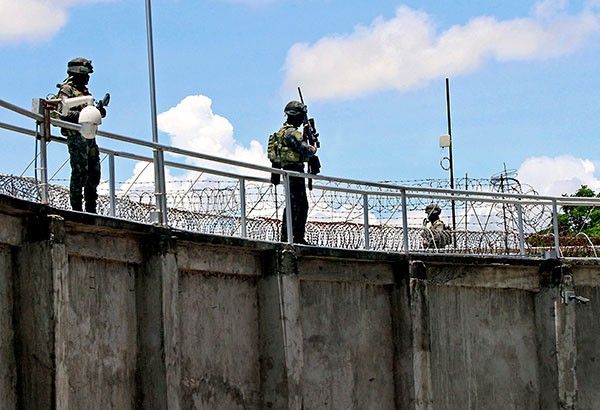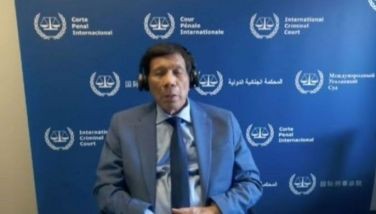A look at the Supreme Court rulings behind Duterte's order to re-arrest freed convicts

MANILA, Philippines — Justice Secretary Menardo Guevarra said President Rodrigo Duterte's order to re-arrest 1,914 convicts of heinous crimes who were granted time allowances for their good conduct is based on two Supreme Court rulings.
He told reporters late Wednesday night: "Basis for re-arrest is not a law (statute) but jurisprudence, which forms part of the law of the land."
When the president, a lawyer himself, announced that he wants the freed convicts to surrender to authorities, he cited "advice" from Guevarra on the legal basis for his order.
Here is a quick look at the two rulings:
People v Fidel Tan, 1967
Sen. Franklin Drilon, a former Justice secretary, first mentioned the case during the Senate inquiry into the Good Conduct Time Allowance—a mechanism to reward prisoners by subtracting days from their time behind bars for each month of good behavior—and Antonio Sanchez, the murderer-rapist whose good conduct in Bilibid supposedly shaved off almost 14 years from his sentence and earned him early release.
The senator urged Guevarra, one of the resource persons at the inquiry, to review the case in looking into what the government would do to return convicts "erronously" freed through the grant of their GCTA to government custody.
The case ruled on the re-arrest of inmate Fidel Tan, whose GCTA was granted by the provincial warden of Samar.
The ruling noted that the provincial warden committed Tan to the Samar provincial jail instead of to the national penitentiary. The warden also took it upon himself to credit Tan's GCTA.
The SC ruled that there was no justification in the warden's "usurping the authority of the Director of Prisons in crediting the prisoner with good conduct time allowance."
The post of director of prisons is now called the director general of the Bureau of Corrections.
The SC also said that even if Tan could benefit from the GCTA, he had an unserved sentence of 11 months and 5 days.
"The prisoner's re-arrests would not place him twice in double jeopardy because his re-incarceration is merely a continuation of the penalty he had not completely served due to the erroneous act of the warden, it is not a new or subsequent conviction," it said.
City Warden of the Manila City Jail v Estrella et al, 2001
The SC case involves the GCTA of convicts at the Manila City Jail.
Integrated Bar of the Philippines lawyers asked the city warden to release the convicts on the grounds that they had already serve their sentences minus the time allowance from good conduct.
The warden refused, citing a provision of the Revised Penal Code that states that the Director of Prisons can grant them.
The warden however issued certifications of good behavior to the respondent-inmates.
Twenty-two of an initial 34 were released with the trial court ordering the release of eight others in 1999.
The SC held that the trial court "erred in ordering the release of respondents before full service of their sentence without the certification of at least of the Director of Bureau of Corrections as to their good conduct time allowances."
The SC the ordered them re-arrested.
"[W]e are constrained to order the re-arrest of all respondents. This can be done without placing them in double jeopardy of being punished for the same offense because their re-incarceration is merely a continuation of the penalties that they had not completely served due to invalid crediting of good conduct time allowances in their favor," the SC held.
The release of convicts of heinous crimes
The Duterte administration has taken the position that the convicts of heinous crimes were, from the start, ineligible to GCTA. The two cases however tackled who has the authority to order the release of inmates through GCTA.
According to BuCor data, there have been 1,914 convicts of heinous crimes released since 2014. More than five directors-general of the BuCor across two presidential administrations ordered those releases.
At a Senate hearing into the issue, BuCor Director General Nicanor Faeldon, whom the president has since told to resign, explained that the bureau had been following the 2013 Implementing Rules and Regulations in processing the inmates' GCTA.
"As far as the bureau is concerned and based on the Uniform Manual, which was later on passed, Section 3 of Republic Act 10592, talks about Article 96 of the Revised Penal Code, it does not exclude any convict of any crime," Faeldon said.
He said that all convicts, if they behave in jail and spend their time in custody studying or mentoring, are granted GCTA.
"What is very clear here is the process they used was never changed since 2014, up to this day," Faeldon said.
"Not a single [Person Deprived of Liberty] who has committed a heinous crime has been denied of GCTA," he added.
Republic Act 10592 only expanded the number of days subtracted from a prisoner for each month of good behavior but GCTA itself is allowed by the Revised Penal Code.
In June, the Supreme Court ruled that the law applies retroactively, meaning prisoners convicted before it was passed in 2013 can avail of the expanded GCTA computation.
- Latest
- Trending
































